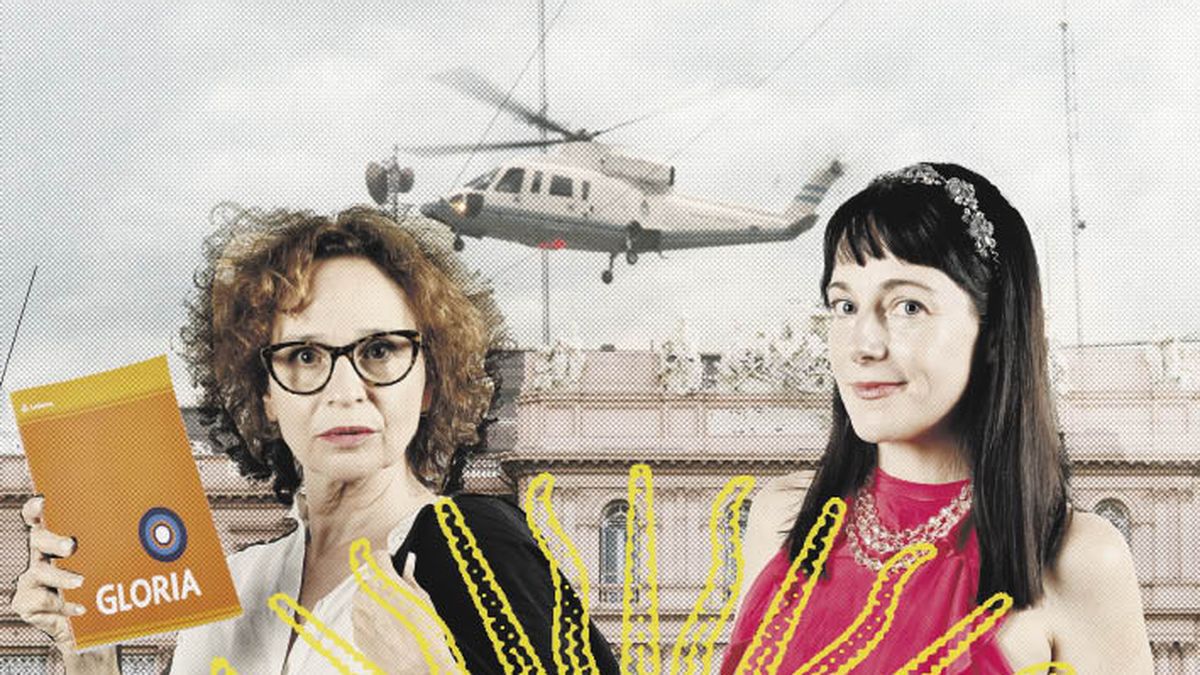Rafael Spregelburd: There are many, but the Latin American formula is the one that generated curiosity, because it presents a cross between the Gothic tale and the fantasy of the Brothers Grimm. It has multiple points of support, such as Gothic cathedrals, to point to a central dome, which is always the wedding of the protagonists. The person who carries out this journey is the female character, where the man is a kind of brat who must be transformed into a father of the family. These rules sound absurd and stereotyped today but they are many more. Powerful characters are evil and put in their place by the exercise of virtue. The soap opera works as long as one respects all the rules and alters one, which gives it uniqueness. That is why we remember “Rolando Rivas taxi driver”, who respected everything except that the protagonist is a man; or “Black Pearl”, with a villainous protagonist. In “Bizarra” we allow ourselves to violate two of those rules to talk about the 2001 crisis as a rickety system and politics and rampant sex.
Q .: Are you saying that these topics are forbidden in the soap opera?
R.S.: As it is a system that seeks massive rating, if the protagonist is a Peronist there will be half the audience that will not want to identify with that and will lose rating. The other rule is that the housewife does not work at nap time, something that sounds like nonsense these days, she has a lot of desire but in the novel it is never consummated. Those who have sex are the villains, virtue escapes sex and the plague.
Q .: How were the productions of “Bizarra” for Europe?
R.S.: My translator Manuela Cherubini came across “Bizarra” and felt that it was talking about Italian political history. Without altering a comma, he also referred to the end of the Berlusconian era. I thought it was a reflection of the time of the corralito, the cavallismo and the Menemism, but I began to smell that I could speak a more global language. It was made in the Neapolitan dialect, then it premiered in Switzerland, directed by Marcial Di Ponzo. Also in Berlin, they asked me to do a read version. The most interesting thing was talking with the translators to see how they translated one unreality into another, because it is gothic fantasy, it is not the daily newspaper. I began to discover in translation the hidden aspects under appearance, what societies put under the carpet and make them very similar. In short, it is the class struggle explained for children.
Q .: How did the podcast come about?
R.S.: Before the pandemic, the CCK asked me for a reissue for the 20 years of the 2001 crisis. It was difficult because at the time there had been 28 fixed actors and many guests for a scene, they all wanted to be in “Bizarra”. In a pandemic, they suggested doing it as a podcast, which was a very common job for actors. We started rehearsing but we realized that adapting it as a radio drama was difficult. In the play, the bodies suffered on stage, the text was mannered, the camera was sought as on TV, the backgrounds were projected, all of that disappeared in podcast format. The text resisted and finally I proposed to do chapter Eleven, the continuation, with those same characters 20 years later and an ode to Macri’s neoliberalism. We went for that and it was a temporary solution to an eternal problem, because impossible projects are truly impossible.
Q .: Why the Eleven as a setting? What are those characters like 20 years later?
R.S.: It has to do with the magic of the first eleven as a prime, odd number, which does not reach a dozen, with eleven actors that in the end we add more, it premiered on December 11, it is a poetic game regarding the singularity, the indivisible, nostalgia. There are three hours that we divide into eleven chapters, and the protagonist goes to live in Once and becomes a cardboard box, embraces the revolution of joy but it is not going well.
Q .: What did the podcast format give you and what took away from it, which took hold in a pandemic?
R.S.: I did not want to pay for the idea of the radio drama because it is an old format, which had splendor in the 50s with highly exaggerated actors who use their voices so that we can see. There is a conventional area that was out of time for me, on the other hand, during the pandemic we began to listen to a lot of philosophy podcasts, a lot of poetry and stories were read, so I was interested in that direction, where you talk about history or read a story, makes it enjoyable when you read instead of acting. I proposed to the actors to try to keep the illusion of the decadent and out of tune soap opera. I wrote it in verse as a parody of the phrasing of the Divine Comedy and that descent into hell, which in this case is the abandoned subway station of Alberti and Pasco. The character goes down to 2002 to find the key to his failure.
Q .: What other projects do you work on?
R.S.: I am waiting for the premiere of the many films that I made because the theater for me is a bit stopped. As in 2016 I did “The stubbornness”, I know that I must wait between five and eight years for it to take place again, the cake is small and there are many talented creators. And the San Martín had enormous contempt for me. Twice they de-scheduled my projects due to lack of resources and forgot to notify me. I had three actors from France with tickets to come to a monumental play, “The End of Europe”, which I premiered in France and Italy, and when I asked what was going on they told me they thought I was not interested. Institutions do not care to program one thing or another.
Source From: Ambito
David William is a talented author who has made a name for himself in the world of writing. He is a professional author who writes on a wide range of topics, from general interest to opinion news. David is currently working as a writer at 24 hours worlds where he brings his unique perspective and in-depth research to his articles, making them both informative and engaging.




